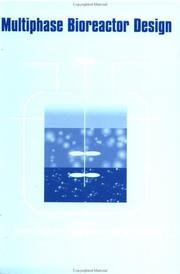| Listing 1 - 7 of 7 |
Sort by
|
Digital
ISBN: 0444632662 9780444632661 Year: 2016 Publisher: Amsterdam, Netherlands Elsevier
Abstract | Keywords | Export | Availability | Bookmark
 Loading...
Loading...Choose an application
- Reference Manager
- EndNote
- RefWorks (Direct export to RefWorks)
Stem Cell Manufacturing discusses the required technologies that enable the transfer of the current laboratory-based practice of stem cell tissue culture to the clinic environment as therapeutics, while concurrently achieving control, reproducibility, automation, validation, and safety of the process and the product. The advent of stem cell research unveiled the therapeutic potential of stem cells and their derivatives and increased the awareness of the public and scientific community for the topic. The successful manufacturing of stem cells and their derivatives is expected to have a positive impact in the society since it will contribute to widen the offer of therapeutic solutions to the patients. Fully defined cellular products can be used to restore the structure and function of damaged tissues and organs and to develop stem cell-based cellular therapies for the treatment of cancer and hematological disorders, autoimmune and other inflammatory diseases and genetic disorders.

ISBN: 0415272092 Year: 2001 Publisher: London : Taylor & Francis,
Abstract | Keywords | Export | Availability | Bookmark
 Loading...
Loading...Choose an application
- Reference Manager
- EndNote
- RefWorks (Direct export to RefWorks)
Book
ISBN: 1908818301 1907568883 9781907568886 9781306177016 1306177014 Year: 2013 Publisher: Oxford : Woodhead Publishing,
Abstract | Keywords | Export | Availability | Bookmark
 Loading...
Loading...Choose an application
- Reference Manager
- EndNote
- RefWorks (Direct export to RefWorks)
Stem cell bioprocessing describes the main large-scale bioprocessing strategies for both stem cell culture and purification, envisaging the application of these cells for regenerative medicine and drug screening. Bioreactor configurations are described, including their applications for stem cell expansion, and stem cell separation techniques such as isolation and purification are discussed. Basic definitions are provided concerning the different types of stem cells, from adult stem cells to the more recent induced pluripotent stem cells. The main characteristics of these different stem cell ty
Regenerative Medicine. --- Stem cells -- Research. --- Stem Cells. --- Stem cells --- Biotechnology --- Cytological Techniques --- Medicine --- Equipment and Supplies --- Investigative Techniques --- Cells --- Culture Techniques --- Analytical, Diagnostic and Therapeutic Techniques and Equipment --- Anatomy --- Clinical Laboratory Techniques --- Health Occupations --- Technology --- Technology, Industry, and Agriculture --- Disciplines and Occupations --- Technology, Industry, Agriculture --- Bioreactors --- Cell Culture Techniques --- Stem Cells --- Regenerative Medicine --- Cell Separation --- Methods --- Biology --- Health & Biological Sciences --- Cytology --- Materials --- Stem cells. --- Materials. --- Chemical engineering --- Genetic engineering --- Colony-forming units (Cells) --- Mother cells --- Progenitor cells --- Cell culture. --- Biotechnology.
Book
ISBN: 012816221X 0128166703 9780128166703 9780128162217 Year: 2020 Publisher: London Academic Press
Abstract | Keywords | Export | Availability | Bookmark
 Loading...
Loading...Choose an application
- Reference Manager
- EndNote
- RefWorks (Direct export to RefWorks)
Tissue engineering. --- Regenerative medicine. --- Regenerative Medicine. --- Tissue Engineering. --- Engineering, Tissue --- Organ Culture Techniques --- Tissue Expansion --- Regenerative Medicine --- Guided Tissue Regeneration --- Cell- and Tissue-Based Therapy --- Medicine, Regenerative --- Medicines, Regenerative --- Regenerative Medicines --- Regenerative Endodontics --- Medicine --- Regeneration (Biology) --- Biomedical engineering --- Regenerative medicine --- Tissue culture --- Microphysiological Systems
Digital
Year: 2013 Publisher: Witney, UK Biohealthcare
Abstract | Keywords | Export | Availability | Bookmark
 Loading...
Loading...Choose an application
- Reference Manager
- EndNote
- RefWorks (Direct export to RefWorks)
Stem cell bioprocessing describes the main large-scale bioprocessing strategies for both stem cell culture and purification, envisaging the application of these cells for regenerative medicine and drug screening. Bioreactor configurations are described, including their applications for stem cell expansion, and stem cell separation techniques such as isolation and purification are discussed. Basic definitions are provided concerning the different types of stem cells, from adult stem cells to the more recent induced pluripotent stem cells. The main characteristics of these different stem cell types are described, alongside the molecular mechanisms underlying their self-renewal and differentiation. The book also focuses on methodologies currently used for in vitro stem cell culture under static conditions, including the challenge of xeno-free culture conditions, as well as culture parameters that influence stem cell culture. Approaches for both stem cell culture and separation in micro-scale conditions are presented, including the use of cellular microarrays for high-throughput screening of the effect of both soluble and extracellular matrix molecules. A further section is dedicated to application of stem cells for regenerative medicine. Maintains a unique focus on both the basic stem cell biology concepts, and their translation to large-scale bioprocessing approachesEnvisages the use of stem cells in regenerative medicine and drug screening applicationsDiscusses the application of microscale techniques as a tool to perform basic stem cell biology studies.
Histology. Cytology --- Pharmacology. Therapy --- Human genetics --- Clinical chemistry
Digital
ISBN: 9780128166703 0128166703 Year: 2019 Publisher: London Academic Press
Abstract | Keywords | Export | Availability | Bookmark
 Loading...
Loading...Choose an application
- Reference Manager
- EndNote
- RefWorks (Direct export to RefWorks)
Book
ISBN: 0444632662 9780444632661 0444632654 9780444632654 Year: 2016 Publisher: Amsterdam, Netherlands Oxford, United Kingdom Cambridge, MA, USA
Abstract | Keywords | Export | Availability | Bookmark
 Loading...
Loading...Choose an application
- Reference Manager
- EndNote
- RefWorks (Direct export to RefWorks)
Human genetics --- Clinical chemistry --- Stem cells. --- Colony-forming units (Cells) --- Mother cells --- Progenitor cells --- Cells
| Listing 1 - 7 of 7 |
Sort by
|

 Search
Search Feedback
Feedback About UniCat
About UniCat  Help
Help News
News